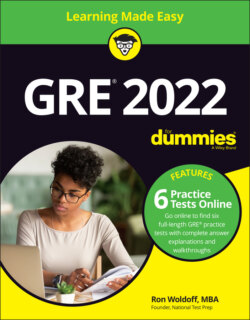Читать книгу GRE 2022 For Dummies with Online Practice - Ron Woldoff - Страница 73
На сайте Литреса книга снята с продажи.
Avoiding common traps
ОглавлениеThe folks who write the GRE are a tricky lot. They bait you with wrong but tempting answers, hoping you’ll bite. By recognizing these common traps, you have a better chance of avoiding them. Here are a few to watch out for:
Mixing main idea with details: Questions asking the main idea or primary purpose of the passage have answer choices that are true but aren’t the main idea. These are trap answers. For example, a passage may describe light pollution from cars or streetlights that obscures stars at night. The main idea isn’t the car headlights or streetlights: It’s the overall effect on nighttime visibility. Double-check the first and last sentences. Is the author asking for increased funding or a course of action? Is the passage challenging a common notion? If you know why the author is writing this, you’ll know the primary purpose of the passage and not be distracted by detail answers.One strategy is to work main idea or primary purpose questions last, especially with a long Reading Comprehension passage. Because you can go back and forth through the questions, you can work them in any order. As you answer the detail questions, you learn more about the main idea; then you can go back and answer that main idea question. Just don’t forget it and move forward, leaving that question unanswered.
Mixing cause-and-effect relationships: Answer choices typically mix up the cause-and-effect relationships of details in the passage. If the tide comes in because of the moon, for example, and this causes all the ships to rise, the question will check your understanding of what caused what to happen. Skim the passage for key words relating to the cause-and-effect described in the question. From the preceding example, look for the words moon, tide, and ships. Find the discussion of these events, and make sure the answer choice reflects the events discussed in the passage.
Mixing in your own knowledge: You may know something about the topic at hand. If you’re like most people, you add detail based on your own knowledge and expertise from other things that you’ve read. Sometimes, these details tempt you to choose an answer that’s true by your understanding but wrong per the passage. Be careful not to mix your own knowledge with what’s in the passage. I had a student who was a chemistry major work on a Reading Comp passage on chemistry, and she vehemently disagreed with what was in the passage. She was probably right — but she got all the questions wrong, based on what she thought it should be instead of what the passage said.
If you’re familiar with the topic, that’s a good thing: You’ll understand the passage better than the other test-takers. However, the passage may take a break from reality, so just take what it says with a grain of salt. Note the differences, but don’t challenge the passage. Instead, go along with its fantasy story and get all the questions right.
